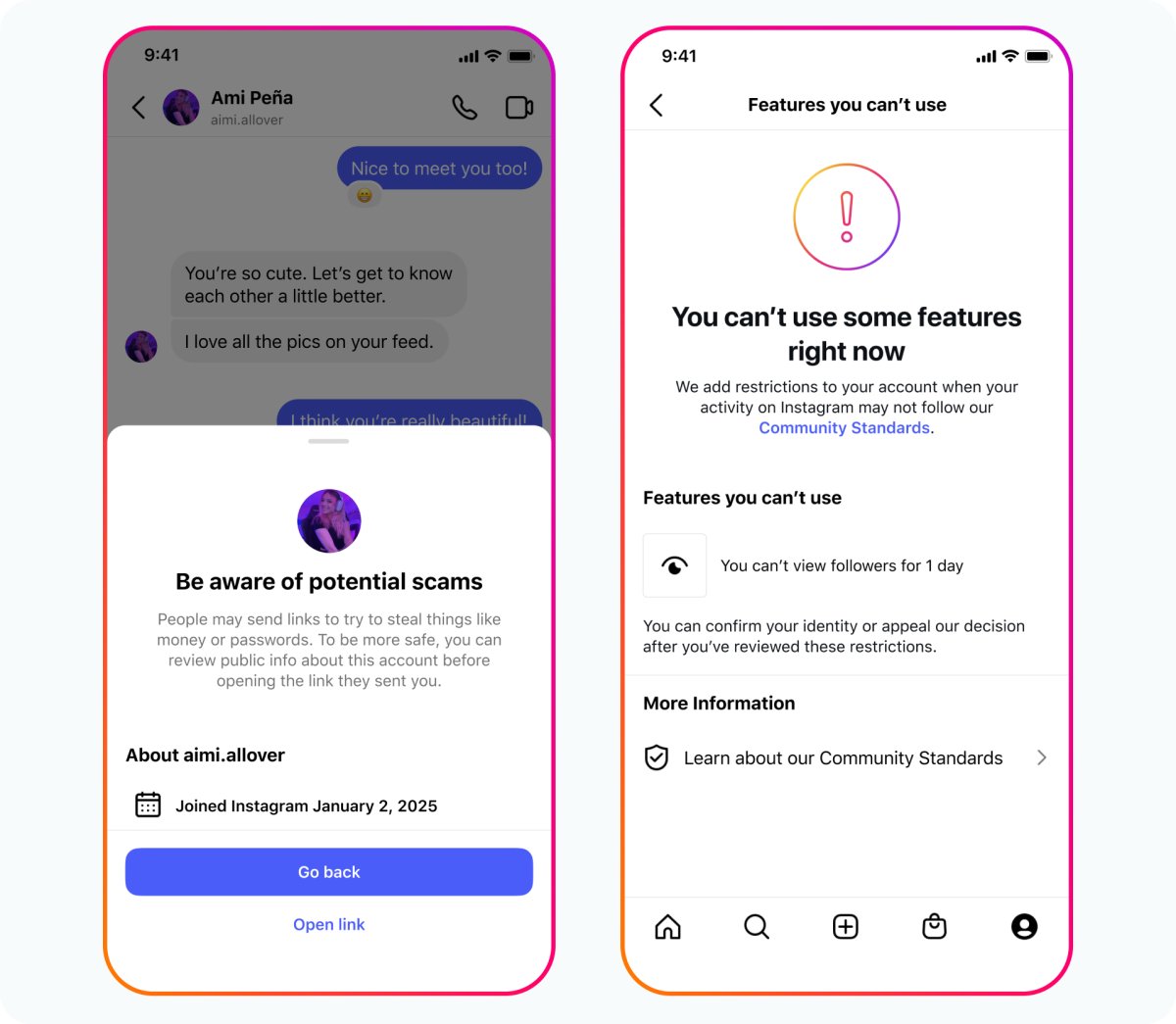Meta is sounding the alarm on romance scams as Americans celebrate Valentine’s Day, urging users to stay sharp and protect their hearts — and wallets — from widespread online deception.
Romance scams, where fraudsters lure victims with false promises of love, prey on thousands of people every year. In 2023, victims lost $1.14 billion to romance scams, with the median loss per person around $2,000, according to the Federal Trade Commission (FTC).
In the first nine months of 2024, there were 42,399 reports of online romance scams, FTC spokesperson Jay Mayfield told Newsweek. Those scams cost people a total of $384 million.
Beyond draining bank accounts accounts—the scammers shatter trust, leave victims emotionally devastated, and can create rifts among loved ones trying to help. That was the case for Denise Curnutt, whose widowed mother-in-law, Grace, fell victim to multiple romance scams for more than seven years.
An Unusual Friend Request
Grace, whose last name Curnutt prefers to keep private, was in her late 70s when she received a friend request on Facebook from a stranger named Lucas. What began as an online connection soon evolved into a fraudulent romantic relationship over the course of about two years. In the later years of her life, Curnutt said Grace became involved in seven overlapping fake relationships, with individuals named Frank, Chris, Lucas, George, Rod, Samson, and Vivian.
Two of them led to “engagements,” which were eventually broken off. Over the years, the string of scammers, who Curnutt suspects were likely same person, exploited Grace for an estimated $50,000 to $60,000.
These love-centered schemes often go “unreported because people tend to be really embarrassed,” said Rachel Tobac, an “ethical hacker” and CEO of SocialProof Security.
They can start on any platform, and often involve a scammer creating a fake profile or using doctored images to try and lure victims, establish trust, develop an affectionate or loving relationship in messages, and then request money or share an “investment opportunity.”
BASTIEN INZAURRALDE / Contributor/Getty Images
With romance scams on the rise, Meta—the parent company of Instagram, Facebook, and WhatsApp, which counts more than 3.3 billion daily users—issued a public advisory this week, warning users about potential scams ahead of Valentine’s Day and how best to avoid them.
Who Do Romance Scammers Target?
Victims of romance scams are “people that you wouldn’t always expect,” Tobac told Newsweek, noting that scammers target individuals across all demographics, ages, geographies, and backgrounds. Fraudsters typically tailor their tactics to specific groups, with older adults and seniors being particularly susceptible to deepfake technology, compared to younger generations.
Deepfakes are highly realistic, AI-generated images or videos that can make scammers appear to be someone they’re not. Tobac highlighted the accessibility of this technology, telling Newsweek, that it takes about “30 seconds to set up and it’s free.”
Tobac said that scammers tend to target younger people with lucrative business opportunities rather than deepfake impersonations, given that these are digital natives who have a higher degree of internet literacy.
According to 2021 FTC data, adults aged 18-to-59 were 13 percent more likely than those over 60 to report falling victim to these scams.
Scammers often target those who are lonely, a point Curnutt highlighted to Newsweek. She noted that her mother-in-law was widowed, alone, and came from a low-income background. In addition, she had family members who had served in the U.S. armed forces, so Grace was particularly drawn to scams involving military figures promising wealth and seemingly fairy-tale endings like “marrying a millionaire.”
Curnutt noted that Grace “was so in love with them,” and was heartbroken when the engagements fell through.
Types of Popular Romance Scams
Tobac said that romance scams “are much longer” than a typical one-off deceit, as scammers try to develop a deep emotional rapport with the victim. In the Meta announcement, the tech giant noted that military impersonation, celebrity impersonations, and fake match-making agencies are popular scams.
Just last month, a French woman in her 50s was scammed out of $850,000 in an online “romance” with someone she met on Facebook whom she thought was the actor Brad Pitt.

X/The Oscar Race
Rita Franklin, director of security public affairs at Meta, told Newsweek that the company took down 408,000 accounts in 2024 just related to military-impersonation scams. The majority came from West Africa.
Many of the military impersonation scams include asking users to transfer funds to cover long-distance phone calls or postage for romantic gifts.
“When we hack, there are two categories that we use: either ‘I’m helping you’ or ‘you’re helping me’. That’s it,” Tobac said, explaining that romance scammers typically exploit victims in one of two ways—either by convincing them to assist a new online partner in financial distress or by luring them with an enticing investment opportunity.
Two of Grace’s fake boyfriends were in uniform, with a handful telling her that they lived on oil rigs. They would often make financial requests of Grace, saying that they were subcontractors on the rig and were not being paid until the job was complete, but needed food and money to help their children back home.
Over the course of the years, Grace completely drained her funds and some of her relatives’, taking out payday loans with high interest, and sending over numerous iTunes gift cards, MoneyGrams, credit cards, and other digital gifts. In addition to various financial scam requests, the scammers also talked about daily life with Grace, and at times were sending sexually explicit messages.
Curnutt noted that Grace was smart and creative, but the scammers were adept at “targeting” her vulnerabilities. She was “acting like a teenager,” Curnutt said, as Grace was completely absorbed by the relationships and became “secluded, on her phone all the time, couldn’t go anywhere, she was panicked if she didn’t have her phone.”
Best Practices to Avoid Being Scammed
Tobac, who contracts with Meta, told Newsweek that users should remember these three things to avoid being scammed.
- “Be politely paranoid,” she said, encouraging users to look up their profile photo and name to see if they appear in multiple places or if other people are talking about them
- “Be suspicious of requests for sensitive data or money soon after meeting somebody online.”
- “Talk to a trusted person before taking actions like sending money or data.” She suggested speaking with a family member, friend, or anyone you trust to get a second opinion.
She warned users that “the scammer wants to isolate you and make you feel silly. They want to make you feel embarrassed so that you don’t ever talk to people. Because that keeps them in business. So, if we can bring this into the light—sunlight is a great disinfectant.”
Curnutt noted that Grace began to close off more when her son pointed out the scams, becoming defensive and often leading to tension, arguments, and more secrecy about the details of her interactions. Curnutt urged people who may know someone going through a scam to “find out the need of that person, are they lonely?” and then offer to have them over or help them through.
With Valentine’s Day upon us, there are expected to be numerous romance scams and potentially additional asks from romance scammers; however, Tobac noted that they occur year round, but often “ramp up throughout the winter because they know people are lonely…scammers try to trick you when you’re down.”
Meta’s Enforcement and Detection Measures
Franklin pointed out that Meta employs a “spectrum of enforcement mechanisms,” as well as several detection measures, which she called a “defend in depth” approach which has multiple layers of defense. Meta analyzes both behavioral patterns and technical infrastructure to identify scammers.

Meta
“When we know that XYZ are particularly high-fidelity or certainty signals, and we know that these accounts are definitely attempting to engage in scam activity, we just identify them and remove them so that people don’t even see them,” Franklin said.
But in some cases, scammers create accounts without immediately engaging in overtly “malicious” activity but still exhibit “suspicious” behavior. In these situations, Meta issues safety notices to warn users of potential scams.
In other scenarios, the platform may also restrict scammers from sending messages or viewing other users’ followers to limit their ability to engage in fraudulent activity, Franklin said.
Franklin noted that there’s a “kind of ecosystem threat” from scammers, and this is a “cross-Internet challenge,” in which tackling scamming on just one application doesn’t solve the problem, as scammers are like “whack-a-mole” problem that continue to pop up.
Click Here For The Original Source.

